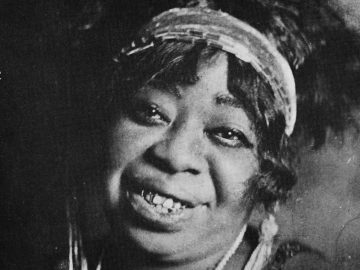Sasha Geffen at The Paris Review:
 Rainey and Smith, along with fellow blueswoman Lucille Bogan, set the stage for pop music’s tendency to incubate androgyny, queerness, and other taboos in plain view of the powers that would seek to snuff them out. They were joined by Gladys Bentley, the stone butch blues singer who performed in a top hat and tails throughout the Harlem Renaissance in New York and whose deep, gritty voice foreshadowed the guttural howls of rock stars.
Rainey and Smith, along with fellow blueswoman Lucille Bogan, set the stage for pop music’s tendency to incubate androgyny, queerness, and other taboos in plain view of the powers that would seek to snuff them out. They were joined by Gladys Bentley, the stone butch blues singer who performed in a top hat and tails throughout the Harlem Renaissance in New York and whose deep, gritty voice foreshadowed the guttural howls of rock stars.
In 1938, the gospel guitarist Sister Rosetta Tharpe laid her music to tape for the first time at age twenty-three. Throughout the following decades, she would develop a style of playing electric guitar that would influence generations of rock musicians to come. Tharpe, too, was queer, and she adapted a phallic symbol of masculinity—the electric guitar—to her own gender-breaking whirlwind of a stage presence.
more here.
